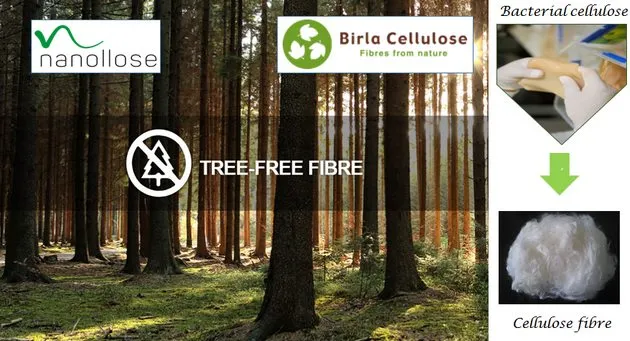Tree free fibre for green fashion
- Copy

In yet another proof of its strong innovation credentials, Birla Cellulose, one of the world’s largest man-made cellulosic fibre producers, has filed a joint patent application with Nanollose, an Australian bio-materials company, for a high tenacity lyocell fibre made from bacterial cellulose. This innovative plant-based fibre is a significant step forward for Birla Cellulose’s sustainability agenda. The brand has already achieved the top rank in Canopy's Hot Button Report '20 for its approach to sustainable fashion.
Lyocell and its USPs
Lyocell is a form of rayon made using a closed loop process with low demand on chemical and water usage, and low waste generation. It is soft, breathable, light and comfortable. The versatility of lyocell fabric makes it suitable for the manufacture of different things such as bed linens, denim, shirts, T-shirts, trousers, and even towels.
Lyocell currently enjoys a lot of attention in the fashion industry with growing interest from both luxury and high street labels. The lyocell market is predicted to be worth US$1.5 billion by 2024, growing at a CAGR of around 8%.
Lyocell is manufactured from commercially harvested wood, primarily trees that grow quickly, without irrigation and virtually any pesticides. Compared to cotton, lyocell requires less than half as much water in production.
Nullarbor™ – the sustainable fibre
Fibre experts at Birla Cellulose, Pulp and Fibre Innovation Centre have produced the nullarbor™ lyocell fibre using feedstock from industrial and agricultural organic waste. The patent application – High Tenacity Lyocell Fibres From Bacterial Cellulose and Method of Preparation Thereof – represents a major advancement over the viscose versions developed by Nanollose, an innovative Australian company that uses an eco-friendly fermentation process to grow bacterial cellulose.
The combination of Nanollose’s tree-free cellulose, along with Birla Cellulose’s closed-loop lyocell production process, has the potential to make nullarbor™ lyocell one of the most ecofriendly and sustainable fibres available. As nullarbor™ fibre uses feedstock from industrial and agricultural organic waste, producers such as Birla Cellulose can potentially reduce the use of wood pulp for the production of lyocell.
There are other advantages too. Nullarbor™ fibre is finer than silk and significantly stronger than conventional lyocell made from wood pulp.
Partnership for innovation
The partnership with Birla Cellulose provides Nanollose with a world class and globally recognised industrial partner, with the ability to accelerate development, commercialisation and a manufacturing foundation. Post patent filing, Birla Cellulose and Nanollose will focus on producing initial commercial quantities of fibre to enable commercial agreements with fashion brands.
Commenting on the patent, the Chief Technology Officer of Aditya Birla Group and Birla Cellulose, Dr. Aspi Patel, said: “This is an exciting development in the area of next generation alternative feedstock and we are looking forward to scaling up this technology in collaboration with Nanollose.”
Birla Cellulose had earlier achieved a breakthrough in manufacturing viscose fibre using pre-consumer cotton fabric waste. The innovation uses a minimum of 20% pre-consumer industrial fabric waste. Another recent innovation was the launch of an antimicrobial fibre.

















